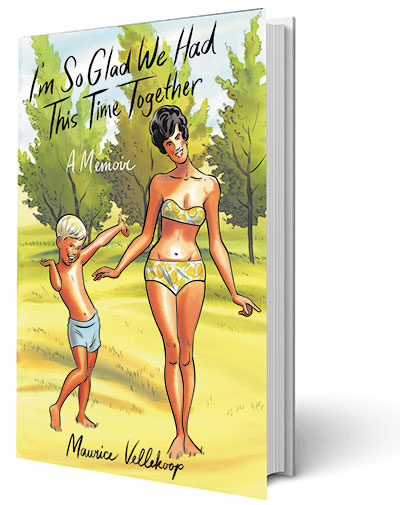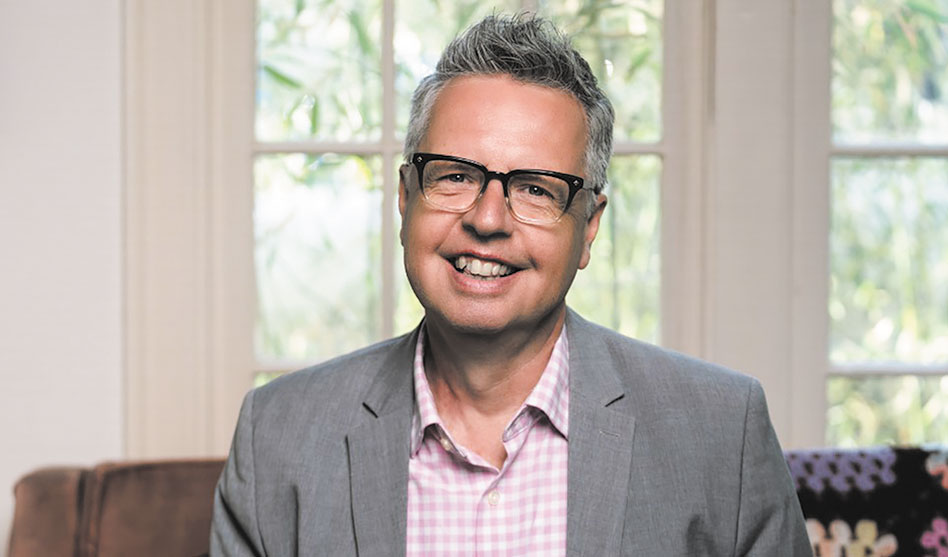Maurice Vellekoop
An interview with Maurice Vellekoop
GREGG SHAPIRO | Contributing Writer
GreggShapiro@aol.com
LGBTQ graphic — as in illustrated — memoirs are nothing new. But it took Alison Bechdel’s award-winning 2006 Fun Home to bring the genre to mainstream audiences. Since then, books such as Maia Kobabe’s Gender Queer and Alice Oseman’s graphic novel Heartstopper have brought increased attention to both non-fiction and fiction LGBTQ works.
Maurice Vellekoop’s marvelous graphic memoir, I’m So Glad We Had This Time Together, (Pantheon, 2024), out in February, is a perfect addition to the genre. A powerfully rendered personal story of growing up in a religiously conservative home in Canada, being the artistic one in a straitlaced family, finding necessary creative outlets for expression and, eventually, self-acceptance.
Maurice was generous enough to make time for an interview in advance of the publication of his book.
Gregg Shapiro: I first became aware of your work with your fabulous 1997 homoerotic primer, Maurice Vellekoop’s ABC Book, which you wrote about in the “Deep Magic” chapter of your new memoir. Please say a few words about the “ABC Book” for the readers. Maurice Vellekoop: The ABC Book pictures a series of homoerotic encounters between various gay stereotypes, arranged alphabetically with very simple rhyming text. For example, “E is for Executives reaching their goals, F is for Firemen sliding down poles.” It’s a naughty riff on Little Golden Books for an adult audience inspired by the subversive work of both Edward Gorey and the great homoerotic artist Tom of Finland, who is such an inspiration. Tom’s world, much as I love it, is relentlessly macho. I wanted my playful vision of gay sex to be more inclusive, so, in addition to all the bikers and cops, I drew some hairdressers and interior decorators having hot sex too.
 You had a conservative religious upbringing. While writing the book, were you consciously writing to a reader who also had a similar experience? What do you hope they will get out of reading your book? I was not necessarily writing for that specific audience, though I certainly thought about it. When I read, it’s to discover stories that don’t necessarily reflect my own experience. I grew up in an unusual, hermetic world of devout Protestant Dutch immigrants, and I thought my book could, in part, be a glimpse into that world. Having said all that, if my book can offer solace or help someone struggling through a similar circumstance, that would be amazing.
You had a conservative religious upbringing. While writing the book, were you consciously writing to a reader who also had a similar experience? What do you hope they will get out of reading your book? I was not necessarily writing for that specific audience, though I certainly thought about it. When I read, it’s to discover stories that don’t necessarily reflect my own experience. I grew up in an unusual, hermetic world of devout Protestant Dutch immigrants, and I thought my book could, in part, be a glimpse into that world. Having said all that, if my book can offer solace or help someone struggling through a similar circumstance, that would be amazing.
In the “Thistletown” chapter, you wrote about how you and your sister Ingrid came out to each other. When you think having a queer sibling with whom to share the coming out experience, how does it make you feel? It meant the world to me to have an ally I could confide in safely at 14. Ingrid and I were very tight in my teens and 20s, and her artistic talent was a constant inspiration. I feel very blessed to have her in my life. And that passage is one of my favorites in the book, especially when the waitress says, “What can I get you girls?”
Like a lot of gay teens, you found a safe haven in your high school’s theater department. Are you still in touch with any friends from that time, and did any others also come out? I’m not in touch with friends from high school. But I recently reconnected with an art school buddy who I always wondered about. He recently came out — in his late 50s — and is happily partnered. It’s never too late!
What do you think your parents, who are both deceased, would think of I’m So Glad We Had This Time Together? What my dad would have thought is anyone’s guess. He was such an unusual, unpredictable creature. I’m sure he would have been proud of the accomplishment, whatever his feelings about his own portrayal. My mother was really dreading the book. She was a very private person, and the book represents a huge invasion of that privacy. Also, though she was quite literary, all the books she loved were written long ago, and she just would not understand the level of candor that modern readers expect from a memoir. Despite her dread, she was unfailingly supportive of the project, always ready to answer my questions, even when what I was asking was quite intimate.
Have you started working on or thinking about your next book project? Yes! My book agent and I are pitching a children’s book written and illustrated by me. I’m also working on some new erotic drawings, which may end up as a book. For lots of reasons, as a young man, I didn’t think I was attractive, and I spent many years in celibacy. Now, when I look at old pictures of myself, I see a pretty, rosy-cheeked, full-lipped twink. So, I’m drawing that character getting all the wild sex he so desperately wanted but couldn’t allow himself to have. I can’t decide whether the project is terribly sad or crazily empowering. Maybe it’s a bit of both!









